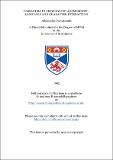Cassandra in Aesychylus' 'Agamemnon' : language and character interaction
Abstract
This study in four parts examines the Cassandra scene in Aeschylus' Agamemnon, the first play in his sole extant trilogy entitled Oresteia. In the first part, a brief survey of Cassandra's language is given in which I try to argue that her deranged state affects her utterances and causes communication problems between her and the Chorus. The first part ends with a preliminary appraisal of her relationship with Apollo. The second part deals with her barbarian aspect. At the beginning, I deal with the general antithesis between Greeks and Orientals and incorporate some information on the oriental and/or primitive elements of Apolline worship. The rest is more focused on Agamemnon and specifically on the debt of Aeschylus to the tradition; and on the oriental and/or primitive elements of Cassandra, without forgetting the King, the Queen and Apollo, whose figure and relationships with his "servants" are briefly discussed. The third part examines the relationship between Agamemnon and Cassandra. Adopting a scene by scene analysis on the meaning of the presence (and sometimes absence) of the King, we come to the conclusion that the King, already overburdened with mistakes, commits another by having, unlike Apollo, a rather carnal relationship with Cassandra. As for the last part, following the same principle of analysis, we deal with the majestic figure of the Queen. Through her manipulation of language, and consequently of the other personages (namely the Elders and Agamemnon), we try to discover differences and possible similarities with Cassandra, on the basis of Clytaemnestra's and Cassandra's marginal status.
Type
Thesis, MPhil Master of Philosophy
Collections
Items in the St Andrews Research Repository are protected by copyright, with all rights reserved, unless otherwise indicated.

